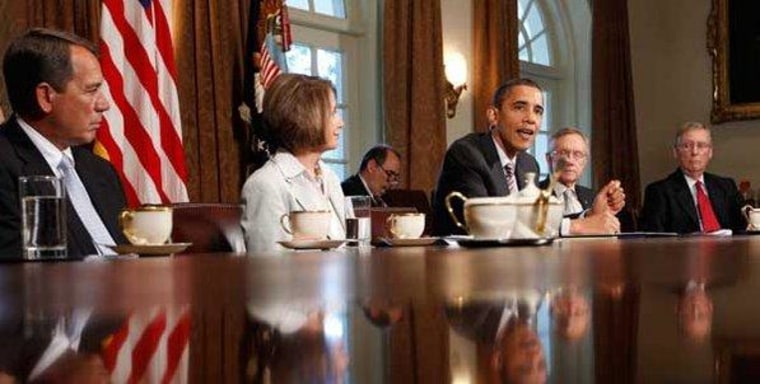The White House has not yet released President Obama's new budget plan, but it's in the on-deck circle and we have a reasonably good idea of what's in it. As we talked about last week, the administration hopes to resolve the parties' fiscal fight by trading entitlement "reforms" for new revenue -- Democrats would accept cuts to social-insurance programs, including chained CPI for Social Security, and Republicans would accept closed tax loopholes and fewer deductions.
Republicans, who reject the idea of compromise, hate the plan. Democrats, who see no reason to cut Social Security, hate it, too. So what is the White House up to? Paul Krugman characterized the whole effort as "Kabuki," and his take is pretty compelling.
The answer, I fear, is that Obama is still trying to win over the Serious People, by showing that he's willing to do what they consider Serious -- which just about always means sticking it to the poor and the middle class. The idea is that they will finally drop the false equivalence, and admit that he's reasonable while the GOP is mean-spirited and crazy.But it won't happen. Watch the Washington Post editorial page over the next few days. I hereby predict that it will damn Obama with faint praise, saying that while it's a small step in the right direction, of course it's inadequate -- and anyway, Obama is to blame for Republican intransigence, because he could make them accept a Grand Bargain that includes major revenue increases if only he would show Leadership (TM).
I suspect that's correct. The conventional wisdom hold several tenets dear: President Obama isn't willing to touch entitlements; he isn't prepared to alienate his base; and if the president were committed to showing real "leadership," he'd meet Republicans half-way with meaningful concessions. (The conventional wisdom has no use for job creation or economic growth, which play no role in the conversation.)
It would seem, then, that the new White House budget plan is intended to challenge these assumptions: he's put his entitlement "reforms" in writing; the left is furious; and he's waiting for Republicans to show at least some interest in compromise. It's about strengthening Obama's political standing -- positioning him as the leader in the middle, ready to make "the tough calls," even if it leads to criticism from the left and right.
But it's a risky strategy.
If the goal is to prove a point to opinion-makers who help shape the conventional wisdom, the White House has to count on centrist pundits -- the folks who reflexively say "both sides" are always to blame in all circumstances -- acknowledging reality and telling the public, "Obama stepped up, but Republicans shrunk from the moment." This, in turn, is intended to shift public opinion and push GOP officials to strike a deal.
So why is that risky? Because those pundits have always instinctively resisted these facts, and there's no evidence Republican leaders give a damn either way. As Jon Chait put it:
For the strategy to really succeed, the BipartisanThinkers have to help persuade Senate Republicans to strike a deal, and then somehow get John Boehner to secretly agree with it and let it come to a vote in the House, even if almost all the House Republicans naturally vote against it.The fallback option is that the BipartisanThinkers stop blaming both sides and start blaming Republicans, though this seems like an extremely forlorn hope -- more likely, the BipartisanThinkers will eventually redefine Obama's compromise position as Big Government liberalism and the center as the halfway point between that and Paul Ryan's plan to kill and eat the poor.
